Daily Vocabulary Words: List of Daily Used Words
Hi there. Welcome to this special section @ Wordpandit.
Our endeavour here is straightforward: highlighting important daily vocabulary words, you would encounter in The Hindu. This is your repository of commonly used words; essentially, we are posting a list of daily used words. Hence, this has significant practical application as it teaches you words that are commonly used in a leading publication such as The Hindu.
Visit the website daily to learn words from The Hindu.
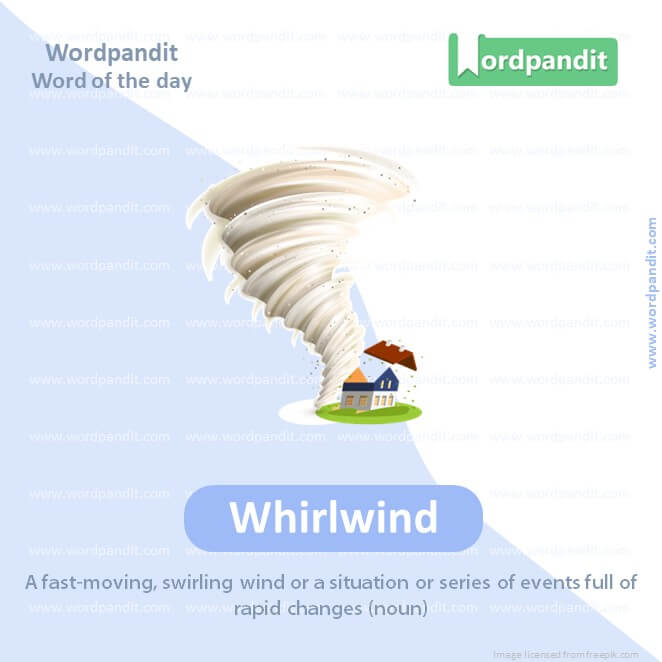
WORD-1: Whirlwind
CONTEXT: Russian President Vladimir Putin, largely confined to the Kremlin due to western restrictions, on December 6 dramatically set out on whirlwind tours to Abu Dhabi and Riyadh in one day. The next day, he received Iranian President Ebrahim Raisi in Moscow. And on December 8, Mr. Putin announced that he would be standing for elections in 2024, affirming that he would be leading Russia at least up to 2030 and possibly beyond.
SOURCE: The Hindu
EXPLANATORY PARAGRAPH: Imagine the wind spinning around really fast and picking up leaves as it goes. A whirlwind is like that. It’s a lot of activity or action happening very quickly and excitingly.
MEANING: A fast-moving, swirling wind or a situation or series of events full of rapid changes (noun).
PRONUNCIATION: WHIRL-wind
SYNONYMS: Tornado, Cyclone, Vortex, Gust, Turmoil, Flurry.
USAGE EXAMPLE:
1. Their vacation was a whirlwind of activities.
2. He was caught in a whirlwind of emotions.
3. The campaign was a whirlwind tour across the country.
4. A small whirlwind swept leaves across the yard.
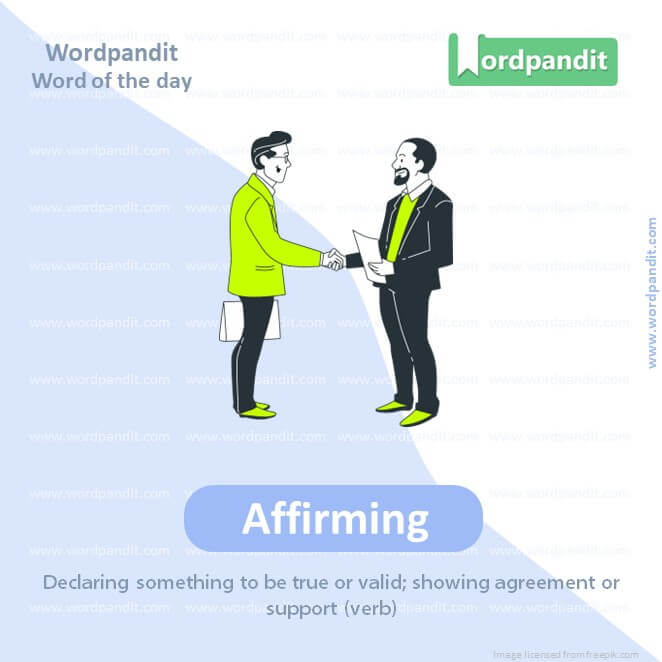
WORD-2: Affirming
CONTEXT: Russian President Vladimir Putin, largely confined to the Kremlin due to western restrictions, on December 6 dramatically set out on whirlwind tours to Abu Dhabi and Riyadh in one day. The next day, he received Iranian President Ebrahim Raisi in Moscow. And on December 8, Mr. Putin announced that he would be standing for elections in 2024, affirming that he would be leading Russia at least up to 2030 and possibly beyond.
SOURCE: The Hindu
EXPLANATORY PARAGRAPH: Imagine saying yes, that’s true or I agree when someone tells you something. Affirming means showing that you agree with or support something or someone.
MEANING: Declaring something to be true or valid; showing agreement or support (verb).
PRONUNCIATION: uh-FUR-ming
SYNONYMS: Confirming, Asserting, Validating, Acknowledging, Endorsing, Ratifying.
USAGE EXAMPLE:
1. She was affirming her commitment to the project.
2. His smile was affirming her decision.
3. The evidence was affirming their theory.
4. Affirming his belief, he continued with confidence.
WORD-3: Pomp
CONTEXT: Mr. Putin’s visit to the Gulf was marked by considerable pomp on the part of the hosts and affirmations of mutual goodwill and camaraderie. The UAE ruler, Sheikh Mohamed bin Zayed, spoke of the importance of strengthening dialogue and cooperation, while Mr. Putin told his Saudi host that nothing can prevent the development of our friendly relations.
SOURCE: The Hindu
EXPLANATORY PARAGRAPH: Think about a big, fancy parade with lots of decorations, music, and people dressed in special clothes. Pomp is all about showing off in a grand, fancy way.
MEANING: A show of magnificence or grandeur; splendid display (noun).
PRONUNCIATION: POMP
SYNONYMS: Splendor, Pageantry, Ceremonial, Grandeur, Display, Ostentation.
USAGE EXAMPLE:
1. The royal wedding was full of pomp and ceremony.
2. He loved the pomp of the military parades.
3. The event was marked by great pomp and extravagance.
4. There was much pomp at the opening ceremony.
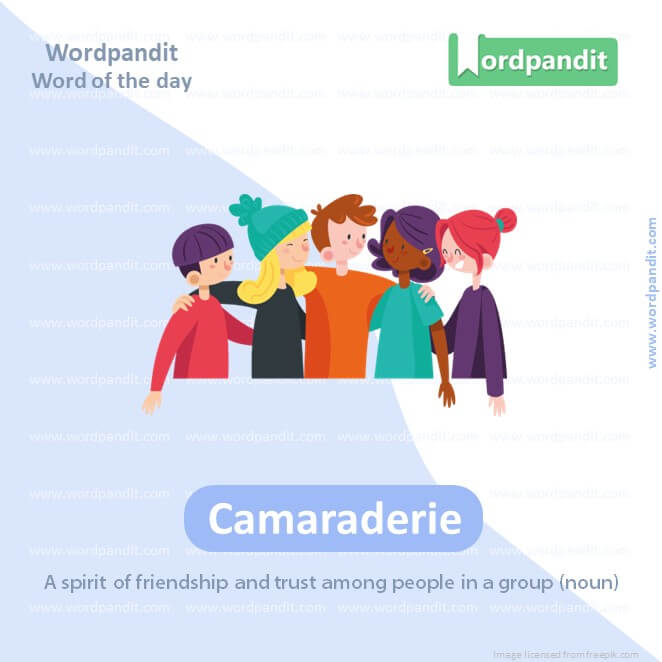
WORD-4: Camaraderie
CONTEXT: Mr. Putin’s visit to the Gulf was marked by considerable pomp on the part of the hosts and affirmations of mutual goodwill and camaraderie. The UAE ruler, Sheikh Mohamed bin Zayed, spoke of the importance of strengthening dialogue and cooperation, while Mr. Putin told his Saudi host that nothing can prevent the development of our friendly relations.
SOURCE: The Hindu
EXPLANATORY PARAGRAPH: Think about having a group of friends you have fun with and trust a lot. Camaraderie is when people are good friends and get along really well, like a team or a group of buddies.
MEANING: A spirit of friendship and trust among people in a group (noun).
PRONUNCIATION: kah-muh-RAH-duh-ree
SYNONYMS: Friendship, Comradeship, Fellowship, Brotherhood, Solidarity, Team spirit.
USAGE EXAMPLE:
1. There was a strong sense of camaraderie among the team members.
2. Camping together built camaraderie in the group.
3. He enjoyed the camaraderie of his fellow volunteers.
4. The camaraderie at the workplace made her love her job.
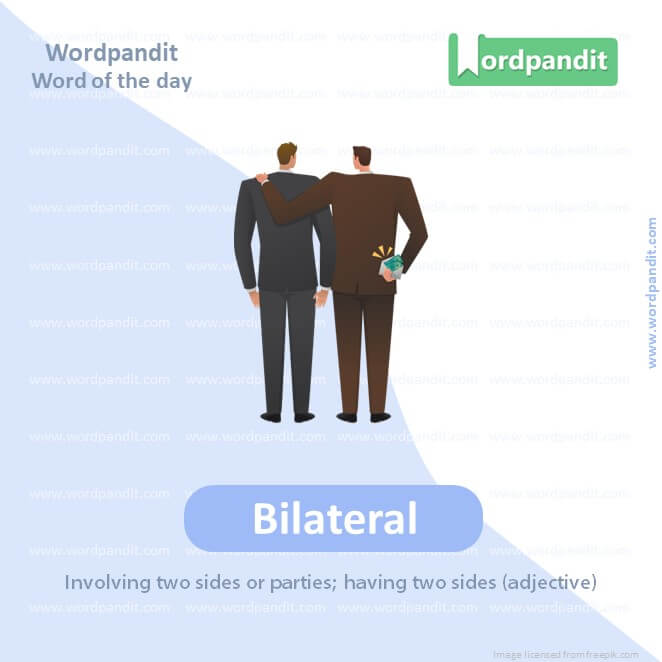
WORD-5: Bilateral
CONTEXT: A Russian spokesman described the talks in the Gulf capitals as a concentrated shot. The agenda was self-evident: continued cooperation among OPEC + members on oil policy; exchange of views on the Ukraine and Gaza conflicts; increasing humanitarian assistance to the Palestinians trapped in Gaza; and enhancing bilateral-political-economic ties. Cooperation among OPEC + countries led by Saudi Arabia and Russia, for instance, has ensured that the agreed production cuts are adhered to and oil prices, much to the U.S.’s chagrin, remain at levels that serve the producers’ interests.
SOURCE: The Hindu
EXPLANATORY PARAGRAPH: Imagine you and your friend both agreeing to trade snacks. Bilateral means something involves two sides or two people both agreeing or working together.
MEANING: Involving two sides or parties; having two sides (adjective).
PRONUNCIATION: BY-luh-tuh-rul
SYNONYMS: Two-sided, Mutual, Reciprocal, Joint, Dual, Cooperative.
USAGE EXAMPLE:
1. The two countries signed a bilateral agreement.
2. The bilateral talks were aimed at improving relations.
3. It was a bilateral decision made by both parties.
4. The project was a bilateral effort between the two companies.
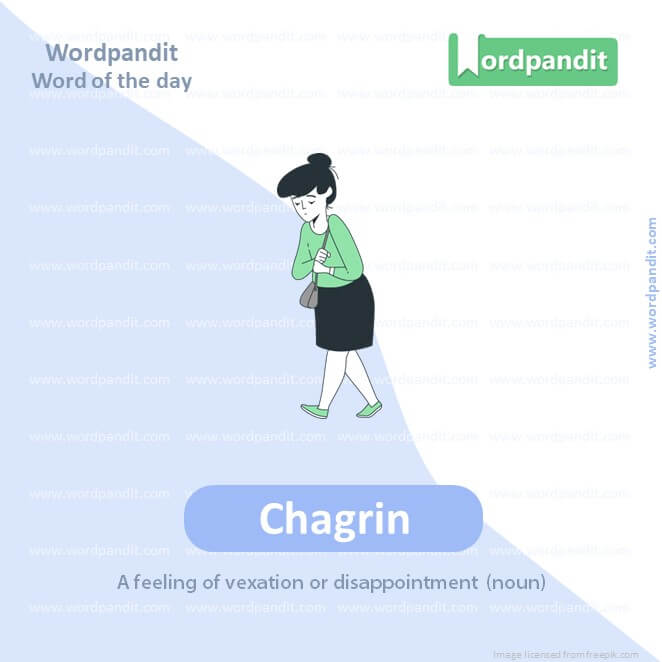
WORD-6: Chagrin
CONTEXT: A Russian spokesman described the talks in the Gulf capitals as a concentrated shot. The agenda was self-evident: continued cooperation among OPEC + members on oil policy; exchange of views on the Ukraine and Gaza conflicts; increasing humanitarian assistance to the Palestinians trapped in Gaza; and enhancing bilateral-political-economic ties. Cooperation among OPEC + countries led by Saudi Arabia and Russia, for instance, has ensured that the agreed production cuts are adhered to and oil prices, much to the U.S.’s chagrin, remain at levels that serve the producers’ interests.
SOURCE: The Hindu
EXPLANATORY PARAGRAPH: Imagine feeling a bit embarrassed or upset because something didn’t go the way you wanted. Chagrin is that feeling of being annoyed or disappointed because things didn’t work out.
MEANING: A feeling of vexation or disappointment (noun).
PRONUNCIATION: sha-GRIN
SYNONYMS: Displeasure, Irritation, Annoyance, Embarrassment, Frustration, Dismay.
USAGE EXAMPLE:
1. To her chagrin, the party was canceled.
2. He hid his chagrin behind a smile.
3. Much to his chagrin, he failed the test.
4. Her chagrin was evident when she lost the game.
WORD-7: Opportune
CONTEXT: In fact, thousands of Russians have set up alternative homes, businesses, and investments in the UAE. Cooperation is thriving between the two countries in the technology sector. As a result, the West has placed the UAE under scrutiny to ensure that restrictions on export of hi-tech products to Russia are complied with. Russia has also conveyed it is standing by to support Saudi Arabia’s civilian nuclear programme at the opportune moment.
SOURCE: The Hindu
EXPLANATORY PARAGRAPH: Imagine if you wanted a snack and right then someone offered you your favorite cookie. Opportune means happening at a very good time, just when you need it.
MEANING: Happening at a favorable or useful time; well-timed (adjective).
PRONUNCIATION: OP-ur-toon
SYNONYMS: Timely, Convenient, Propitious, Favorable, Auspicious, Suitable.
USAGE EXAMPLE:
1. His arrival was most opportune.
2. It was an opportune moment to ask for a raise.
3. She received an opportune offer for a new job.
4. The break in the weather came at an opportune time.
WORD-8: Onerous
CONTEXT: Iran and Russia, as targets of increasingly onerous western sanctions, challenge the West’s global strategic leadership and seek the realization of a multipolar world order. Flowing from this, they have built substantial bilateral relations in the energy and military areas: in March this year, the Russian, Chinese and Iranian navies carried out joint exercises in the Gulf of Oman. In November, it was reported that Iran would get Sukhoi Su-35 aircraft from Russia, as also training aircraft and attack helicopters. Iran has boosted Russia’s military prowess in Ukraine with supplies of drones, ammunition, and body armor.
SOURCE: The Hindu
EXPLANATORY PARAGRAPH: Think about carrying a really heavy backpack that’s hard to carry. Onerous means something is difficult and takes a lot of effort, like a big, heavy job or responsibility.
MEANING: Involving a great deal of effort, trouble, or difficulty (adjective).
PRONUNCIATION: OH-nuh-rus
SYNONYMS: Burdensome, Heavy, Laborious, Arduous, Taxing, Demanding.
USAGE EXAMPLE:
1. The task was an onerous responsibility.
2. She found the duties to be onerous and challenging.
3. The contract imposed onerous conditions on the company.
4. He carried the onerous burden of leadership.
WORD-9: Ammunition
CONTEXT: Iran and Russia, as targets of increasingly onerous western sanctions, challenge the West’s global strategic leadership and seek the realization of a multipolar world order. Flowing from this, they have built substantial bilateral relations in the energy and military areas: in March this year, the Russian, Chinese and Iranian navies carried out joint exercises in the Gulf of Oman. In November, it was reported that Iran would get Sukhoi Su-35 aircraft from Russia, as also training aircraft and attack helicopters. Iran has boosted Russia’s military prowess in Ukraine with supplies of drones, ammunition, and body armor.
SOURCE: The Hindu
EXPLANATORY PARAGRAPH: Imagine bullets or shells used in guns or cannons. Ammunition is what people use to load into weapons to make them work. It’s not just bullets; it can also mean anything used to fight or argue.
MEANING: The material fired, scattered, dropped, or detonated from any weapon, or used to attack or defend in a conflict (noun).
PRONUNCIATION: am-yoo-NISH-uhn
SYNONYMS: Bullets, Shells, Cartridges, Missiles, Rounds, Projectiles.
USAGE EXAMPLE:
1. The soldiers were running low on ammunition.
2. He stocked up on ammunition for his hunting trip.
3. The debate team used facts as their ammunition.
4. Ammunition was scarce during the war.
WORD-10: Armour
CONTEXT: Iran and Russia, as targets of increasingly onerous western sanctions, challenge the West’s global strategic leadership and seek the realization of a multipolar world order. Flowing from this, they have built substantial bilateral relations in the energy and military areas: in March this year, the Russian, Chinese and Iranian navies carried out joint exercises in the Gulf of Oman. In November, it was reported that Iran would get Sukhoi Su-35 aircraft from Russia, as also training aircraft and attack helicopters. Iran has boosted Russia’s military prowess in Ukraine with supplies of drones, ammunition, and body armor.
SOURCE: The Hindu
EXPLANATORY PARAGRAPH: Think about knights wearing metal suits to protect themselves. Armour is special clothing that people wear in battles or fights to keep themselves safe from harm.
MEANING: A protective covering, often made of metal, used to prevent damage from being inflicted to an object, person, or vehicle by weapons (noun).
PRONUNCIATION: AR-mur
SYNONYMS: Shielding, Protection, Defensive gear, Guard, Mail, Plate.
USAGE EXAMPLE:
1. The knight wore shining armour.
2. The soldiers put on their body armour.
3. The tank was fitted with heavy armour.
4. In medieval times, armour was essential for warriors.
Vocabulary Daily Words
Among the myriad aspects of language learning, the role of ‘vocabulary daily words’ attests to their undeniable importance. These everyday words form the bedrock of communication. Whether used in casual chat or formal discussion, the fluency and understanding of ‘vocabulary daily words’ can significantly uplift the quality of interaction. However, the vital question is, how to effectively learn these ‘vocabulary daily words’?
The crux of learning ‘vocabulary daily words’ lies in a well-rounded approach that encompasses exposure, understanding, memorization, and practice. Rote memorization might seem like a quick solution, but it lacks context and, thereby, retention. Hence, opt for a diverse range of resources like books, newspapers, podcasts, and digital media. These will bring ‘vocabulary daily words’ to life, providing real-life usage examples and making the learning process inherently engaging.
Next, using memory-enhancing techniques can significantly improve retention of ‘vocabulary daily words’. Techniques such as flashcards or the Leitner System align with the principles of spaced repetition, allowing more effective and long-term learning. Incorporating mnemonic devices, associating new words with unique stories or images, can further facilitate this learning process.
The key to fully grasping ‘vocabulary daily words’ lies in practical usage. Make it a habit to use these words in your daily communications. Whether it’s a friendly conversation, a professional email, or a social media post, try integrating these new words. Doing so provides hands-on practice, strengthening your comprehension and application of these words.
In a nutshell, ‘vocabulary daily words’ are a treasure in the language learning landscape. By harnessing diversified resources, utilizing memory techniques, and actively using these words, your grip on the ‘vocabulary daily words’ will strengthen significantly. So, turn the pages, hit play, start a conversation, and let these ‘vocabulary daily words’ shape the story of your linguistic journey.











